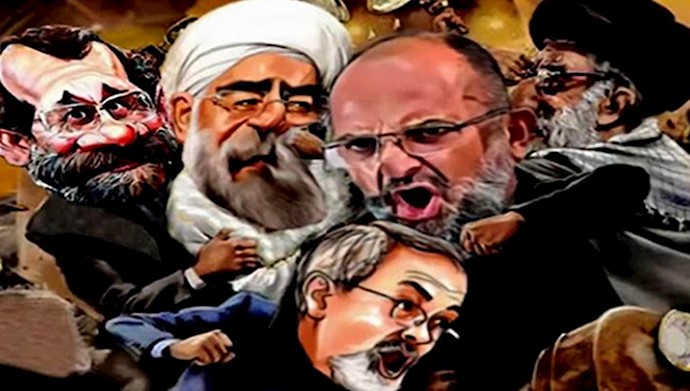Analysis by PMOI/MEK
Iran, April 14, 2019 – In the aftermath of devastating floods in many parts of Iran, there is an explosive popular mood rooted in discontent with the regime’s handling of this natural disaster. These new reasons that mostly hit the poor working class—a traditional part of the regime’s very low percentage social base—just add to a growing stack of resentment for the mullahs that have rendered the current economic situation conditions for many Iranians unbearable.
Fearing the growing risk of popular uprisings, Iranian officials from both ruling factions are increasingly blaming their political opponents for the widespread misery.
Abbas Abdi, a famous figure of the so-called moderates, considers the popular “protests” the result of “accumulated demands” by the population.
“We shouldn’t interpret the number of [popular] protests and pessimism under the context of the enemy’s evil, but rather we should attribute it to accumulated [popular] demands whose proposal or pursuance have not been possible in normal circumstances. They [these demands] put pressure on the society’s mental state and are waiting for an opportunity to exit and there is no better opportunity than flood or similar events,” he said.
Referring to the importance of helping the flood victims, Abdi had earlier a stark warning.
“We should pay attention that a 'trust crisis' leads to a 'credit crisis' where at the end the people prefer a neutral foreign judge over a national one,” he explained.
Shoaresal, a state-run website, writes about the consequences of mismanaging the help and support for the flood victims in Lorestan province.
“This increasing distrust will have horrible consequences in the future… We shouldn’t contribute to the distrust and sadness of the tolerant and peaceful citizens of Lorestan more than what is already there with our inefficiency,” the website further warned both ruling factions in Iran.
The Ebtekar newspaper, close to the faction of Iranian regime president Hassan Rouhani writes another warning piece.
“We are still experiencing a public distrust for official media over social media. Nowadays, the cyberspace and its reports are more trusted by the people than official media,” he said in reference to the regime’s fake news campaign backlashing.
The newspaper then asks “Whether one can be optimistic that the public’s faded trust can be restored or not?” and then quotes a pundit saying: “Considering the current approach, there is no hope that the people will trust the official media again.”
The Arman newspaper writes about the necessity to remove some ineffective officials to control the damage done to the public trust for the Islamic Republic, and contain the people’s rage and discontent towards the whole regime.
“Considering the circumstances, the [regime supreme leader Ali Khamenei] needs to put another policy in place… and without political and factional inhibition and without regards for nepotism, prosecution, indictment, and punishment of the perpetrators of these events…” the piece reads in part.
In its April 9 editorial, Ebtekar newspaper writes about the inefficiency of the regime’s crisis management of the regime.
“When the crisis happens, we become like a tangled web and worsen the crisis with our actions! This was evident in the fight between the Islamic Revolutionary Guards Corps and the president! Our decisions in these situations are mainly based on impetuosity, delinquency, and miscalculations,” the newspaper further writes.
The newspaper then refers to a number of failed Revolutionary Guards (IRGC) projects.
“Increasing non-standard dam construction in the Lake Urmia area, establishing farming areas, increasing the number of water boreholes and changing grape gardens to apple. All such measures have without a doubt played a role in drying the lake. Yet the most important parameter in drying Lake Urmia was the construction of the crossing road over the lake that has cut the upper half of the lake from the lower half,” the piece reads in part.
The newspaper than concludes its editorial with a famous poem by Saadi Shirazi, a renown 13-century Iranian poet.
“You may be able to stop the water with a shovel at its wellspring
“But when it’s full, you can not stop it even with an elephant”
That it seems, is where the Islamic Republic is inevitably headed at the moment.





